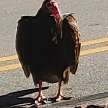Atlanta -- What Comedy Has Aspired To
A TV Review by J.C. Embree

Knowing Donald Glover to be a versatile artist from his acting work (primarily in Community) as well as a naturally funny comedian and eclectic musician, it was suffice to say I had high hopes when I put on the episode “The Big Bang” on Hulu about two months ago. Looking for a new show to get excited about and knowing Glover’s capabilities, I kept an observant eye out, hoping to find signs, or at least glimmers, of greatness in the realm of Atlanta.
When the credits rolled, however, while not particularly unimpressed, I was admittedly underwhelmed. (Mild spoilers ahead) it begins and ends with a scene that encapsulates much of rap culture, a murder committed by an up-and-coming rapper against the nobody who smashed his rear-view mirror over a misunderstood dispute, the kind that occurs all under five minutes.
The credits rolled and I thought it was good -- but not great. I felt it was setting up a success story that was a bit archetypal- the struggling young man, smart but lazy, goes on-again-off-again with the mother of his child, becomes his rapper-cousin’s manager, and they’d build an empire and form friendships on the way. Sure, I assumed that Glover could do such a story with talent-on-display and graceful execution, but that wouldn’t make it special or original. Yawn.
However, three weeks ago, when I was scrolling around online, I saw a headline for an article that read “Donald Glover wants Atlanta to be Twin Peaks with Rappers.” I read that and felt a rekindling of my original interest. I read the article, just one lengthy paragraph, and was sold to try the second episode (“Streets on Lock”).
And it was here that I understood that the up-and-coming rapper-cousin Alfred/”Paper Boi” (Brian Tyree Henry) would not be facing any real repercussions for the aforementioned murder. Not legally, not physically, not even psychologically (at least, not in “Streets on Lock”). Sure, it takes place at a police station, where Glover’s character Earn sits with Alfred and asks “Do you think he died?” but thereafter they leave, and life just goes on.
It was in this nonchalant way of dealing with serious, even morbid subject matter that I began to understand what Glover had in mind for this surreal comedy/drama. Combining realism and absurdity, he depicts circumstances, situations, and interactions that are both painfully relatable and unapologetically otherworldly. He’s not just depicting the city in Georgia, he’s commenting on life there as it is, all-the-while carving his own path in both small-screen history.
First though, cutting back to the article where he likens it to Twin Peaks- when I read that I felt compelled to watch it, not to declare loyalty as a die hard fan of David Lynch’s Peaks universe, but in sheer disbelief. When I read the article, I actually rolled my eyes at the notion, for not only does every television auteur want to create their own Twin Peaks (to the extent of sacrificing their own vision), but very few come close to capturing its mystique.
That said, I can say wholeheartedly that Atlanta manages to riff off of Peaks in a blend of the comedically unreal and the development of an auteurist universe, it does something that many of the Peaks-wannabes falter in- carving its own path. Glover has received praise for albums like “Because the Internet” and his stand-up special “Weirdo,” which I’d imagine granted him not only the opportunity of vast creative control but the self-assurance to take it. Many episodes are written by both he and his younger brother (Stephen Glover) as well as his long-time music-video collaborator Hiro Murai, and the tale of Atlanta is told episodically, one that commandeers new messages and ideas in almost every episode. While there are overarching arcs in Atlanta, you could watch many episodes out-of-context and still get a thorough experience.
The show begins, as told, with Glover’s Earnest “Earn” Marks, a basically-homeless disillusioned dropout who becomes the manager of the locally famous “Paper Boi” who is also known to Earn as his cousin Alfred. Alongside them is Darius, played by Lakeith Stanfield. If Atlanta were mediocre or even boring, I still may watch all of it simply for Stanfield’s comedic timing and Darius’ warped (and consistently stoned) musings and philosophies. Less stuck-up than many “visionary” types and less classically moronic than many “stoner” types, in a lesser show Darius would likely be a “breakout”-type character. There’s also Vanessa (“Van”) played by Zazie Beetz, rounding out the cast entirely with up-and-coming black actors. The mother of Earn’s child, she, much like Earn with his intelligence and Alfred with his talent, is held back by pride and personal neuroses to the point where much of her life engages in a one-step-forward/two-steps-back routine that regulates her in a cycle of distaste and settling.
And that is where Atlanta stands out above other shows with similar premises. It lingers and meanders, where even its episodes that could be considered character deep-dives are typically quiet and mellow. It sets its own pace, knowing full-well that not everyone will stay for the ride, but that those who do will help develop into something worthy of a cult following.
Most episodes of Atlanta are about things that this reviewer can’t particularly relate to, that being the experience of being black in an American setting. This however does not pose an issue for viewers of any race, for it is almost parodic in its portrayal of white characters and even episodic black characters, playing on stereotypes and the unfair preconceived notions we have for people based on their appearances. And it pulls no punches, particularly in the episode “B.A.N” an episode that could be watched without context that alludes to (and skewers) many existing networks and TV shows (BET Network, Charlie Rose, the work of Eric Andre) and picks no sides when it comes to various social and artistic issues such as song lyrics, free speech, homophobia/transphobia, the new idea that is “trans-racial identity,” and, of course, racism.
Two seasons in, even at its most formal Atlanta never takes itself too seriously, choosing to make you think within strange situations, blatant symbolism, and conversational subtext rather than deep character monologues, heartfelt conversations, politically-fueled rants, or any other boring cliches. It’s the kind of work that reminds the critics why art exists, not just to entertain, nor to give thematic messages, but to make you think while in a state of involvement and enjoyment. So many comedy shows are terrible, but with shows like Atlanta, we see the genre’s not going out without a fight.
About the Creator
J.C. Traverse
Nah, I'm good.






Comments
There are no comments for this story
Be the first to respond and start the conversation.